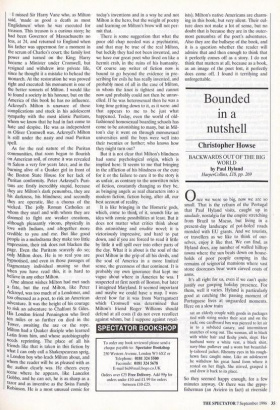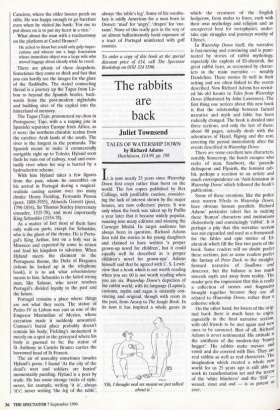Bounded in a
nutshell
Christopher Howse
BACKWARDS OUT OF THE BIG WORLD by Paul Hyland HarperCollins, f18, pp. 269 Once we were so big, now we are so small. That is the refrain of the Portugal that Paul Hyland visits, caught up in saudade, nostalgia for the empire stretching from Brazil to Macao, but living in a present-day landscape of pot-holed roads mended with EU grants. And we tourists, or travellers as we like to think of our- selves, enjoy it like that. We can find, as Hyland does, any number of walled hilltop towns where the sun beats down on house- holds of poor people camping in the remains of seignorial mansions where vast stone doorcases bear worn carved coats of arms.
It's all right for us, even if we can't quite justify our gawping holiday presence. For them, well it varies. Hyland is particularly good at catching the passing moment of Portuguese lives at unguarded moments. Here on a slow train
sat an elderly couple with goods in packages tied with string under their seat and on the rack; one cardboard box was pierced to let air in to a subdued canary, and intermittent snatches of song out. The woman, all in black with white hair and fleshy jowls, slept. Her husband wore a white vest, a black shirt, navy-blue pullover and a worn but beautiful- ly-tailored jacket. Rheumy eyes in his rough- hewn face caught mine. Like an adolescent he withdrew his great hand from where it rested on her thigh. She stirred, grasped it and drew it back to its place.
So they seemed happy enough, for a few minutes anyway. Or there was the gypsy- fisherman (an Avieiro in fact) at riverside Caneiros, where the older houses perch on stilts. He was happy enough to go barefoot even when he visited his bank: 'For me to put shoes on is to put my heart in a vice.'
What about the man with a tracheotomy on the platform at Castel Branco?
He ached to shout but could only gulp impre- cations and wheeze out a huge frustration whose immediate object was a large wife who moved luggage about silently while he raved.
There are plenty of these snapshots. Sometimes they come so thick and fast that you can hardly see the images for the glare of the flashbulbs. The stated connecting thread is a journey up the Tagus from Lis- bon to beyond the Spanish border, back- wards from the post-modern nightclubs and building sites of the capital into the hinterland of memory.
The Tagus (Tejo, pronounced tay-zhou in Portuguese; Tajo, with a a rasping jota in Spanish) separates Europe from Africa, as it were: the northern chivalric realms from the carefree Arab lands of the south. The river is the longest in the peninsula. The Spanish meant to make it commercially navigable right up to Toledo; Hyland soon finds he runs out of railway, road and even- tually river when his way is barred by a hydroelectric scheme.
With him Hyland takes a few figures from the past, whom he assembles on his arrival in Portugal during a magical- realistic casting session over too many drinks: Henry Fielding, Fernando Pessoa (poet, 1888-1935), Almeida Garrett (poet, 1799.1854), Sir Thomas Stucky (mercenary crusader, 1525-78), and most importantly King Sebastido (1554-78).
As a matter of fact most of them have only walk-on parts, except for Sebastiao, who is the ghost of the drama. He is Portu- gal's King Arthur, lost on a holy war in Morocco and expected by some to return and lead his kingdom to salvation. When Hyland meets the claimant to the Portuguese throne, the Duke of Braganca (whom he looked up in the telephone book), it is to ask what sebastianismo means to him. Sebastiao is the failed strong man, like Salazar, who never resolves Portugal's divided loyalty to the past and the future.
Portugal remains a place where things are not what they seem. The statue of Pedro IV in Lisbon was cast as one of the Emperor Maximilian of Mexico, whose execution made it suddenly unwanted. Comoes's burial place probably doesn't contain his body; Fielding's monument is merely on a spot in the graveyard where his body is guessed to be; the statue of St Anthony in Castelo Branco carries the borrowed head of St Francis.
The air of unreality sometimes invades Hyland's prose. I found 'At the city of the dead's west end soldiers are buried' momentarily puzzling. Hyland is a poet by trade. He has some strange tricks of style, never, for example, writing 'it is', always 'it's'; never writing 'the leg of the table', always 'the table's leg'. Some of his vocabu- lary is oddly American for a man born in Dorset: 'mad' for 'angry', 'drapes' for 'cur- tains'. None of this really gets in the way of an almost hallucinatorily lucid exposure of a tract of Portugal uninfested with golf courses.
To order a copy of this book at the special discount price of £14, call The Spectator Bookshop on 0181 324 5500.



























































 Previous page
Previous page